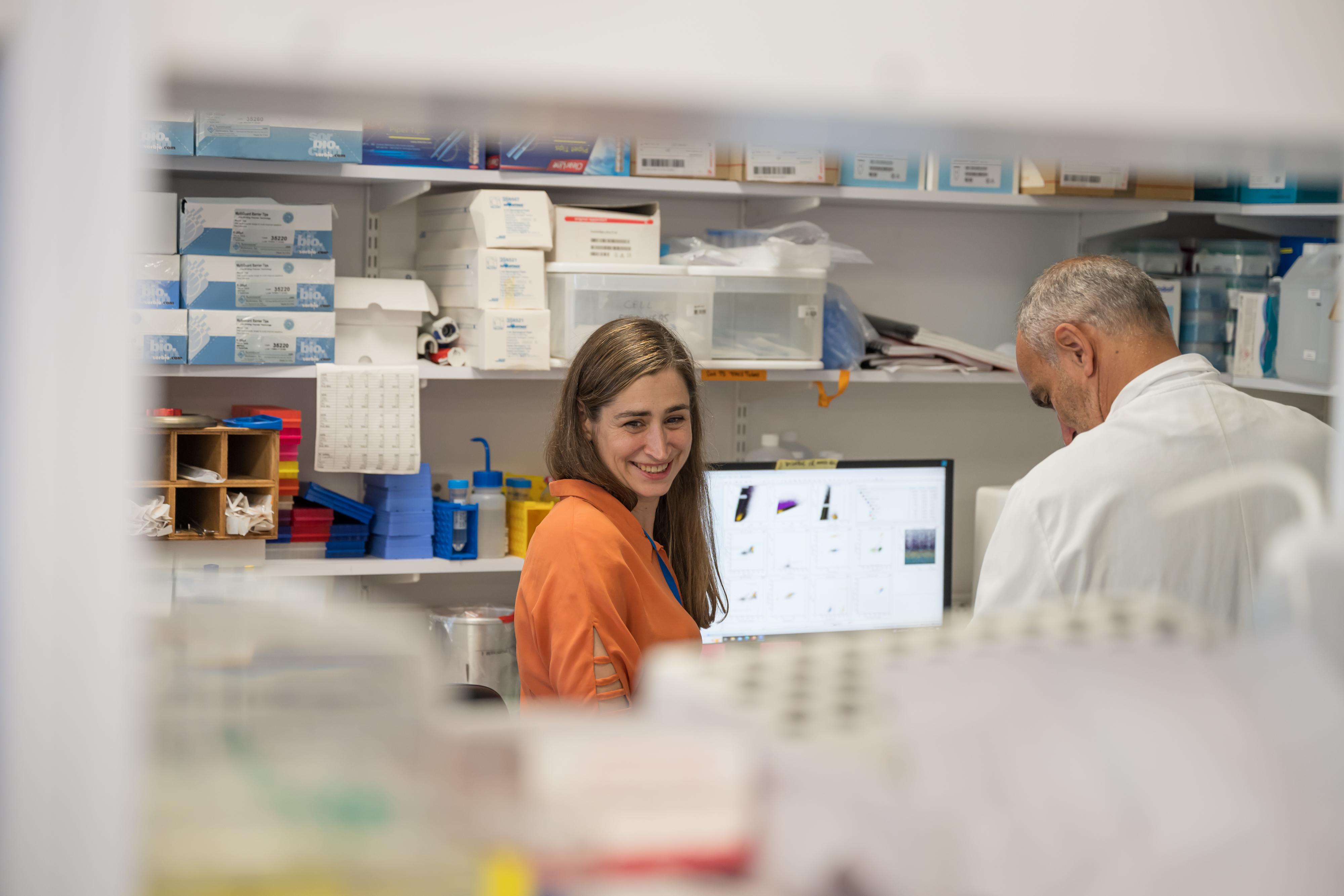Multiple sclerosis is often diagnosed between the ages of 20 and 40, at an age when the choice of starting a family is discussed. Professor Sandra Vukusic, head of department at the neurological hospital in Lyon, indicates that this autoimmune disease is not an obstacle to the desire to have a child, but that several short and long term factors must be taken into account in the case of a pregnancy project.

Why Doctor: In France, multiple sclerosis affects around 120,000 people. What is this disease that represents the leading cause of non-traumatic disability in young adults?
Sandra Vukusic: It is an autoimmune disease. In multiple sclerosis, the defense system, which is supposed to protect us from external attacks, turns against our own cells and attacks them. One of the targets is the myelin sheath which surrounds the extensions of neurons called “axons”. This phenomenon will cause inflammation and areas of demyelination, leading to episodes of neurological deficit, or even a loss of autonomy if nothing is done to prevent the recurrence of inflammatory episodes. This pathology affects young people, on average around 30 years old, and concerns women in three quarters of cases.
“Pregnancy reduces the risk of flare-ups”
This chronic inflammatory pathology can affect life as a couple, sexuality and the desire to have children. But does it have an impact on pregnancy?
As a reminder, pregnancy is not recommended in patients with multiple sclerosis. Because yes, having a normal pregnancy while controlling the progression of the disease is possible!
Studies show that this disease has no negative consequences on pregnancy. There were no differences in obstetric complications, premature births or risk of malformations in the children of women with multiple sclerosis and those of healthy women.
We have known since the end of the 90s that in the short term, pregnancy leads to a reduced risk of relapses. During these nine months, the immune system must adapt so as not to attack the foreign body, which in this case is the fetus. Clearly, pregnancy has an anti-inflammatory effect. On the other hand, after childbirth, more precisely in the first trimester postpartum, we observe a resumption of anti-inflammatory activity, because the hormones linked to pregnancy will decrease. However, in the long term, there is no link between having had children and the risk of disability.
In case of multiple sclerosis, should a pregnancy be planned?
Indeed, it is preferable to plan a pregnancy for two reasons. The first: it is better to consider pregnancy during a period of inactivity of the disease, that is to say when there have been no relapses for at least 12 months. The second: certain basic treatments, which make it possible to control the progression of the pathology, must be stopped before conceiving a child, because they can interfere with the development of the fetus. Therefore, it is appropriate to discuss planning a pregnancy with your neurologist during a preconception consultation so that the latter can make a therapeutic modification if necessary. In addition, this appointment allows the patient to ask other questions about her pregnancy plan, in particular childbirth, breastfeeding or even vaccinations.
Does this autoimmune disease impact fertility?
Some treatments, for example mitoxantrone, can reduce fertility, but there is no reduction in fertility linked to multiple sclerosis itself. However, there is an impact on fertility, that is to say the number of children per woman. Indeed, given sexual disorders, pain, a drop in libido, a less fulfilling life as a couple or even concerns about the progression of the disease, some patients choose to have fewer children. This is also the case when a disability is present, because they are afraid of not being able to take care of their child.
MS: “Several treatments can be continued throughout the pregnancy”
In the event of proven sterility of the couple, is it possible to consider medically assisted procreation (MAP)?
Medically assisted procreation may be considered for people with multiple sclerosis. However, the ovarian stimulation procedure may increase the risk of relapses in the following two to three months if treatment is not continued. Today, we keep the basic treatment to control the increased risk of flare-ups. It is therefore essential that the decision and the modalities of a PMA are discussed in consultation with the neurologist and the PMA specialist.
During pregnancy, what treatments can be used?
Currently, there are several treatments that can be continued until at least the beginning of pregnancy, or even throughout the pregnancy. Other medications can be stopped before pregnancy but have a prolonged and powerful effect on progressive disease control. Thus, women no longer have to choose between their pregnancy plan and the treatment of their illness!
What is the follow-up for pregnant women suffering from multiple sclerosis during pregnancy?
During pregnancy, a neurological consultation dedicated to the interactions between pregnancy and multiple sclerosis is recommended. Obstetric follow-up is the same as in the general population, but it will instead be carried out by an obstetrician, due to the existence of a chronic illness. In the event of significant disability, multidisciplinary care is recommended to best adapt the management of after-effect symptoms.

Pregnancy and MS: “Nothing contraindicates the epidural” during childbirth
Regarding childbirth for people with this inflammatory disease, are there any special precautions?
There isn’t necessarily one. The course of childbirth in a patient suffering from multiple sclerosis is no different from that of other women, because childbirth occurs in a relatively “automatic” manner, with little use of voluntary muscles. In an ongoing French study, in which more than 600 women with MS are currently participating, there is only one woman who walked with a cane at the time of her pregnancy, for example. However, the birthing position can be adapted to the physical constraints experienced by the mother-to-be. For example, in the event of significant stiffness, we may advise that she give birth on her side for more comfort.
Can they benefit from an epidural?
Nothing contraindicates the epidural. Some anesthesiologists fear that it will trigger flare-ups, even though the cause of their appearance is multiple sclerosis. Therefore, it is recommended to offer patients the same methods of analgesia and anesthesia for childbirth as in the general population.
Is breastfeeding possible in case of multiple sclerosis?
Breastfeeding is not discouraged in patients with this autoimmune disease. Studies have shown that exclusive breastfeeding for three to six months is associated with a reduced risk of flare-ups in the postpartum period. However, this information should be taken with caution, because everything depends on the activity of the multiple sclerosis during pregnancy and the desire to resume basic treatment. Today, certain treatments are compatible with breastfeeding, this means that you no longer have to choose between treating your illness and thriving in motherhood with breastfeeding.
When is basic treatment resumed?
This is an individual choice. The decision must be made with the neurologist and based on the evolution of the disease.
















